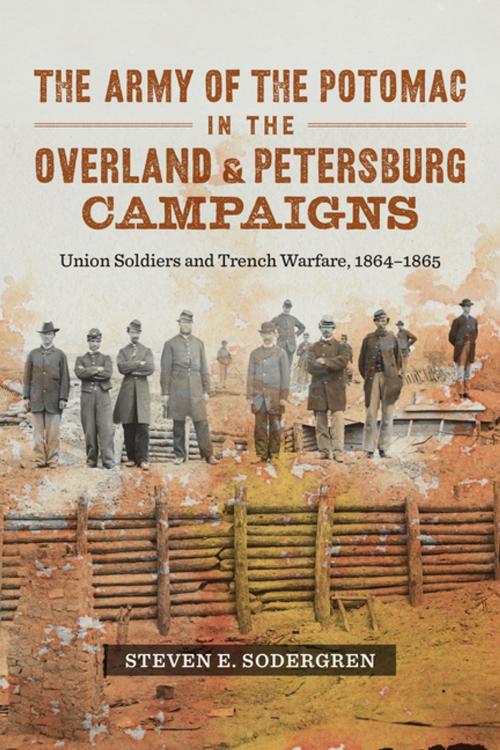The Army of the Potomac in the Overland and Petersburg Campaigns
Union Soldiers and Trench Warfare, 1864-1865
Nonfiction, History, Americas, United States, Civil War Period (1850-1877)| Author: | Steven E. Sodergren | ISBN: | 9780807165584 |
| Publisher: | LSU Press | Publication: | June 5, 2017 |
| Imprint: | LSU Press | Language: | English |
| Author: | Steven E. Sodergren |
| ISBN: | 9780807165584 |
| Publisher: | LSU Press |
| Publication: | June 5, 2017 |
| Imprint: | LSU Press |
| Language: | English |
The final year of the Civil War witnessed a profound transformation in the practice of modern warfare, a shift that produced unprecedented consequences for the soldiers fighting on the front lines. In The Army of the Potomac in the Overland and Petersburg Campaigns, Steven E. Sodergren examines the transition to trench warfare, the lengthy campaigns of attrition that resulted, and how these seemingly grim new realities affected the mindset and morale of Union soldiers.
The 1864 Overland Campaign created tremendous physical and emotional suffering for the men of the Army of the Potomac as they faced a remarkable increase in the level and frequency of combat. By the end of this critical series of battles, surviving Union soldiers began to express considerable doubt in their cause and their leaders, as evidenced by widespread demoralization and the rising number of men deserting and disobeying orders. Yet, while the Petersburg campaign that followed further exposed the Army of the Potomac to the horrors of trench warfare, it proved both physically and psychologically regenerative. Comprehending that the extensive fortification network surrounding them benefitted their survival, soldiers quickly adjusted to life in the trenches despite the harsh conditions. The army’s static position allowed the Union logistical structure to supply the front lines with much-needed resources like food and mail—even a few luxuries. The elevated morale that resulted, combined with the reelection of Abraham Lincoln in November 1864 and the increasing number of deserters from the Confederate lines, only confirmed the growing belief among the soldiers in the trenches that Union victory was inevitable. Taken together, these aspects of the Petersburg experience mitigated the negative effects of trench warfare and allowed men to adapt more easily to their new world of combat.
Sodergren explores the many factors that enabled the Army of the Potomac to endure the brutal physical conditions of trench warfare and emerge with a renewed sense of purpose as fighting resumed on the open battlefield in 1865. Drawing from soldiers’ letters and diaries, official military correspondence, and court-martial records, he paints a vivid picture of the daily lives of Union soldiers as they witnessed the beginnings of a profound shift in the way the world imagined and waged large-scale warfare.
The final year of the Civil War witnessed a profound transformation in the practice of modern warfare, a shift that produced unprecedented consequences for the soldiers fighting on the front lines. In The Army of the Potomac in the Overland and Petersburg Campaigns, Steven E. Sodergren examines the transition to trench warfare, the lengthy campaigns of attrition that resulted, and how these seemingly grim new realities affected the mindset and morale of Union soldiers.
The 1864 Overland Campaign created tremendous physical and emotional suffering for the men of the Army of the Potomac as they faced a remarkable increase in the level and frequency of combat. By the end of this critical series of battles, surviving Union soldiers began to express considerable doubt in their cause and their leaders, as evidenced by widespread demoralization and the rising number of men deserting and disobeying orders. Yet, while the Petersburg campaign that followed further exposed the Army of the Potomac to the horrors of trench warfare, it proved both physically and psychologically regenerative. Comprehending that the extensive fortification network surrounding them benefitted their survival, soldiers quickly adjusted to life in the trenches despite the harsh conditions. The army’s static position allowed the Union logistical structure to supply the front lines with much-needed resources like food and mail—even a few luxuries. The elevated morale that resulted, combined with the reelection of Abraham Lincoln in November 1864 and the increasing number of deserters from the Confederate lines, only confirmed the growing belief among the soldiers in the trenches that Union victory was inevitable. Taken together, these aspects of the Petersburg experience mitigated the negative effects of trench warfare and allowed men to adapt more easily to their new world of combat.
Sodergren explores the many factors that enabled the Army of the Potomac to endure the brutal physical conditions of trench warfare and emerge with a renewed sense of purpose as fighting resumed on the open battlefield in 1865. Drawing from soldiers’ letters and diaries, official military correspondence, and court-martial records, he paints a vivid picture of the daily lives of Union soldiers as they witnessed the beginnings of a profound shift in the way the world imagined and waged large-scale warfare.















